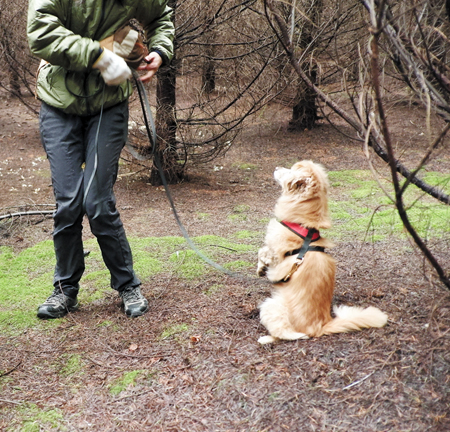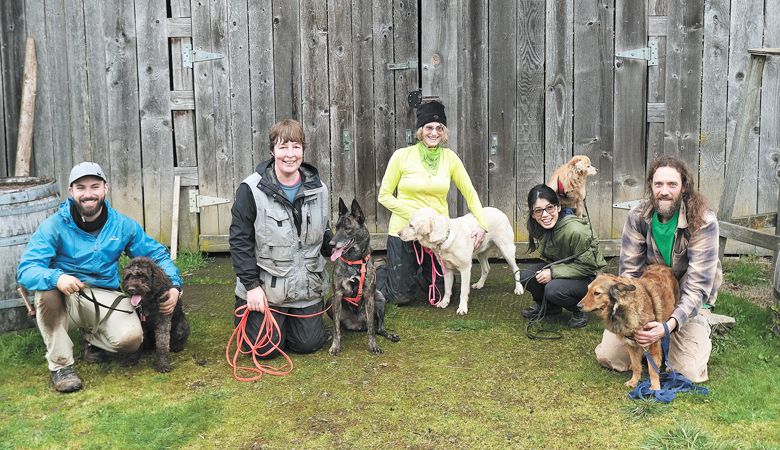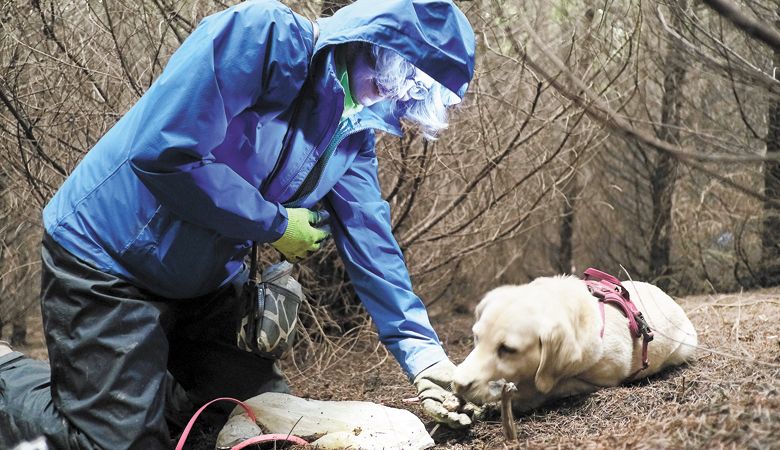A Breed Apart
Unearthing Oregon’s truffle dog contest
By Sophia McDonald
Three at a time, competitors entered the horse arena at the Lane County Fairgrounds. Each dog and handler team took their place at the head of a row of shallow black bins filled with dirt. Buried in those boxes was the bait: a flexible tube containing truffle-infused olive oil. If they could identify five, they’d advance to the next stage in the sixth annual Joriad North American Truffle Dog Championship.
Vodka, a 6½-year-old Dutch shepherd, seemed particularly eager to begin. She strained against her leash, yipping with excitement and whipping her tail, as owner Jenny Thorp kept a tight hold. As soon as master of ceremonies Bob Walker signaled the start of the match, Vodka took off, nose to the ground as she searched for the distinct aromas given off by truffles. In no time at all, she began pawing at a box. A judge helped her search and then held up a stick. The process repeated itself, and, quickly, Vodka completed round one.
While the dogs searched, Walker encouraged the crowd to ask questions. There were plenty: How does a person or dog learn about hunting for truffles? Where are they likely to find them? Can an old dog learn new truffle tricks?
“Any dog can find truffles,” Walker responds. “It’s just a matter of how well they can find them.”

Combining education and fun is central to the Joriad and its sponsoring organization, the Oregon Truffle Festival. The event launched in 2006 with the goal of promoting the culinary value of the state’s four species of native truffles. According to co-founder Dr. Charles Lefevre, having a truffle dog competition was a goal from the beginning — although it took 10 years for it to actually happen.
French and Italian truffles are some of the most prized and expensive ingredients anywhere in the world. Although researchers knew for decades that Oregon had its own supply, they developed a reputation for being poor quality in the ’80s because many of the people who were harvesting them were raking up both the ripe and unripe morsels — a practice fine for researchers who were studying them but less effective for people collecting truffles for food.
“You can think of a truffle like a peach, in the sense that if it’s not ripe, it’s not worth eating,” Lefevre explains. “The trouble is that like many fruits, the truffle reaches full size and sits there for months before it actually ripens.” A truffle on the brink of ripeness may still develop once it’s pulled out of the ground — much like a tomato will continue to ripen on a kitchen counter. But fully immature truffles lack the flavor and aroma that made them famous. As more of these unripe truffles entered the marketplace, people began to believe the Oregon truffle was inferior to its French and Italian cousins.
In 2000, Lefevre started working with European truffles. “I had them in the refrigerator side by side with Oregon truffles that I had harvested myself,” he explains. “And it became very clear to me right away that the reputation Oregon truffles had for being weak was completely wrong. They’re absolutely as powerful — if not more powerful in terms of the intensity of the aroma — than the European species.”
Something, he believed, must be done to redeem Oregon’s reputation.
The festival was a major part of that initiative, and promoting the use of dogs for harvesting — a common practice in Europe — was just as important. A dog can be trained to smell a ripe truffle in the ground, which means its handler digs up only the correct ones. Lefevre says, “The dog is doing the quality control.”
One of the early issues with promoting dog-led harvesting — and hosting a canine competition — was the lack of local pooches; there were no truffle dogs west of the Mississippi at that point. Lefevre needed to find people who could train dogs. It took several years of organizing demonstrations and small seminars to find his champions of the cause. After trainers taught the basics at the festival around 2009, interest took off rapidly.
“Six years ago, it felt like we finally had a critical mass of truffle dogs,” says Lefevre, who estimates roughly 1,000 dogs in the Pacific Northwest were trained at that point. “Finally, there were enough to hold a competition and have enough people attend it.” The festival named its contest the Joriad after Oregon’s state soil. It is now the only truffle dog competition in North America.
The event draws between 20 and 30 amateur entrants every year. Vodka, the Dutch shepherd, definitely qualifies; owner Thorp says the first time the pooch ever smelled a truffle was in November — although the dog had done other types of “scent work.” Vodka seemed to catch on quickly; she was one of five dogs to advance to the final round of this year’s Joriad. For that match, dogs traveled into the woods to search for the real thing.
Results announced later that evening revealed that Vodka had taken second place. Thorp says the pair will definitely continue to hunt truffles. She comments, “What’s better than a day in the forest with your dog and then having something delicious at the end of it?”
For the second consecutive year, first prize went to Joey, a 4-year-old yellow field Labrador owned by Ava Chapman, who gushed about the many benefits the activity has provided her and her four-legged friend. Hunting for truffles has made them a team and helped build a far-flung community they both treasure.
“The whole thing about truffles is they are part of the communication between other trees and provide nutrients for the trees,” she explains. “There’s this whole symbiotic relationship going on. And I find that above the ground with humans. I look around at the amount of friends I’ve made just from truffle hunting with this dog, and I think truffles create the (same relationships) above ground as below ground.”













